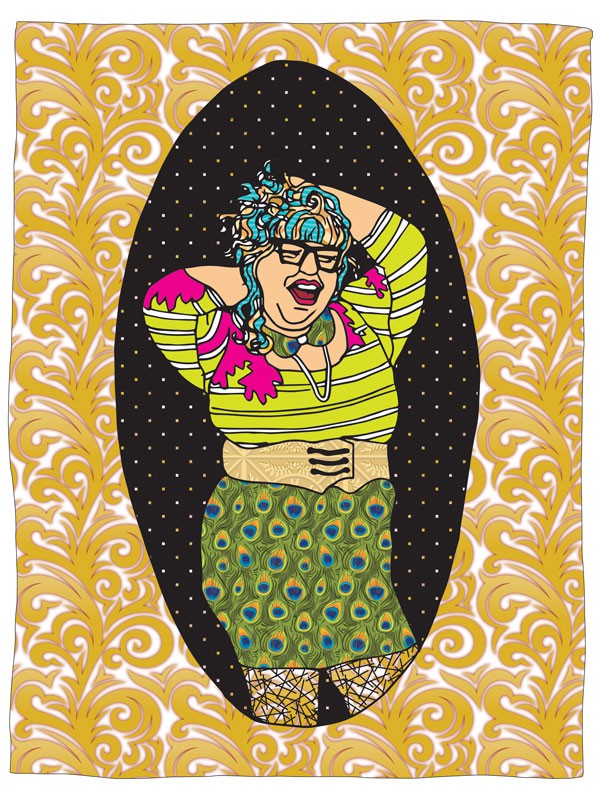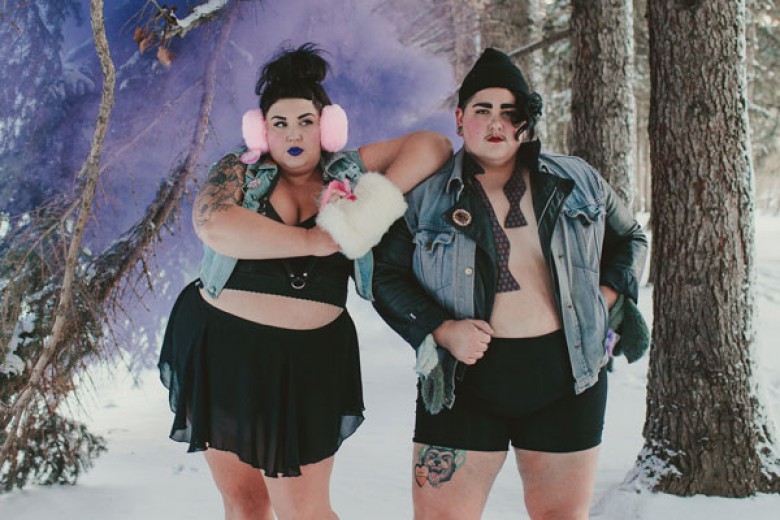
Those of us who fight to end weight stigma face many challenges, not the least of which is resistance to the idea that weight stigma is even worthy of inclusion in the index of social justice struggles.
As activists, we are asked whether the struggles of fat people in a thin-obsessed culture are as dire as other injustices, and we’re often derided for our focus. “You cannot compare a sort of disgust and disrespect for people who serially overeat and indulge and make themselves ill, sometimes barely able to walk, to an ignorant hatred of someone because they’re a different colour, sexuality, or sex,” writes Fiona Phillips, responding in the Mirror to a U.K. study on weight discrimination. The truth is that the fight to end weight stigma is intrinsically connected to struggles around gender, race, and class. A willingness to acknowledge the negative impact of weight stigma on fat people, and indeed people of all sizes, is critical to all social justice efforts.
Fat advocates are people who identify and speak out against weight stigma and fat oppression with the hope of fostering a new norm of body acceptance. When I spoke with fat advocates in Canada and the U.S. about the challenges of making fat stigma a social justice issue, two common themes emerged. The first is the frequent dismissal of fat stigma as a serious issue when compared to others, and the second is the belief that fatness is the result of individual choices and behaviour and thus not appropriate for broad-based social activism. Unquestioning acceptance of the fat-is-bad/thin-is-good dichotomy has blinded us to both the reality of natural body diversity and to the oppression faced by larger people. Taking fat stigma seriously means confronting these attitudes in ourselves and in others. Fat matters.
Punished for being fat
Consider health care. A 2010 report in the American Medical Association Journal of Ethics notes that, “It is well documented that health professionals often carry the negative biases of our society toward individuals who are obese.” Researchers have found that doctors’ attitudes “reflect the widespread perception of obesity as a lifestyle choice or characterological flaw.” A 2013 study on health and quality of life for overweight and obese people published in the Journal of Eating Disorders suggests that decreased health outcomes for fat people may be less about the negative impacts of fat tissue and more about the results of attempts to alter bodies with yo-yo dieting, weight-loss surgery, and drugs. Fear of judgment keeps many fat people from accessing health care, and those who do visit a doctor are often simply diagnosed as obese, with other potential causes and health concerns – and more holistic approaches – ignored.
Fatness is also punished in the workforce. An October 2014 report by law professor Jennifer Shinall of Tennessee’s Vanderbilt University finds that women considered to be overweight “are more likely to work in lower-paying and more physically demanding jobs; less likely to get higher-wage positions that include interaction with the public; and make less money in either case compared to average size women and all men.” Shinall has been quick to point out that education was not a factor in the study’s findings. “I controlled for education in my study,” she says in an interview for the Guardian. “What is going on is being driven by the employer side of the equation.” The report found that “Heavy women earned $9,000 less than their average-weight counterparts; very heavy women earned $19,000 less.” To further illustrate the intersection of gender and weight stigma, note that while half of top male CEOs in the U.S. are obese, only five per cent of top female CEOs are.
In my province, Saskatchewan, there is the case from the early ’90s of Sandra Lynn Davison, a nurse’s aid in Melville whose application for employment was denied because she was obese. In an article for the Alberta Law Review discussing Davison’s subsequent human rights challenge, Emily Luther outlined the discrimination Davison faced and argued that body size should “be its own prohibited category of discrimination” in section 15 of the Canadian Charter of Rights and Freedoms.
The situation is no better in politics. Maggie De Block, Belgium’s recently appointed health minister, has faced intense public scrutiny about her size that was never directed at the previous health minister, Luc Van den Bossche, himself a large man.
Interestingly, one of the first lines of attack against fat activists is their physical appearance. Activists who live in fat bodies are often accused of trying to rationalize their own fatness or of being bitter because they aren’t considered attractive. However, even fat activists who are thinner face backlash based on their appearance. For example, in a recent conversation with me, Linda Bacon, author of the groundbreaking book Health at Every Size, reflected that most of the negative commentary written about her has focused on her physical appearance, not the content of her work. “They can’t dismiss me for being fat, so instead they criticize me because I don’t gender conform.”
Socializing stigma
Addressing weight stigma tends to be seen as private and personal work, carried out through support groups and other safe venues of discussion and empowerment. Jenny Ellison, a Canadian studies professor at Trent University in Peterborough, says that the framing of fat oppression as a personal issue may account for some of the disconnect between fat activism and other social justice work. Even within the fat acceptance community, there can be reluctance to accept weight stigma as a social justice issue. “Within our community, we fall into the trap of our own hierarchies,” says Jill Andrew, a body image advocate. “[Whether] someone is published or considered ‘more militant’ determines what activism should be heralded or not.”
My question is, how can the fat acceptance community continue to move forward and gain credibility with broader social justice movements? In my conversation with Bacon, she suggested starting inside the fat acceptance movement itself by bringing a broader analysis to weight stigma work. This means exploring how the experience of fat women who live in poverty differs from those with greater economic security and looking at how race and sexual orientation impact the experience of living in a larger body.
We have a unique opportunity from within the fat acceptance movement to demonstrate the importance of including weight stigma within an intersectional social justice framework. This will help us bring fat oppression into the public domain and encourage critical analysis of body size rhetoric. When a statement is made about fatness, Andrew suggests we ask some basic questions: Who is saying it, who benefits from it, who gets hurt, and what is the subtext?
Tracey Mitchell, a Saskatoon-based organizer and activist, believes it’s important to find common cause with people working on other issues. “Instead of trying to convince them the obesity epidemic is a myth, I would rather have a conversation on where common interests might lie. What can we work on together? Where do we share values?” Looking for commonalities, like the goal of making exercise and healthy nutrition accessible to all people regardless of size or income, keeps us from falling into the trap of comparing oppressions, sometimes referred to as the Oppression Olympics, where people rank their hardships in order to gain credibility and dismiss others. It isn’t known if the distinct oppression faced by fat people is the same, less, or worse than other forms of oppression. But we can acknowledge a core thread of fat stigma at the intersection of issues of race, class, and gender.
Adopting an intersectional approach to our own weight stigma activism will assist us in our struggle to be taken seriously by other social justice advocates. Mitchell is a coordinator with the activist leadership program Next Up and says that “ability, inclusion, and body positivity are some of the lenses that we use at Next Up.” Bringing body positivity into the equation only strengthens concerns around gender, class, and colonization.
My hope is that we can face our internalized fears and anxieties about fat and see how the fight to end fat discrimination and weight stigma is intertwined with other struggles. Let’s move past the conditioned repulsion toward fat bodies and embrace a vision of social justice that celebrates a diversity of body shapes and sizes.



